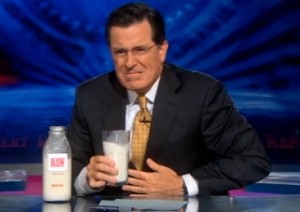The scientific fringe craves the credibility – the impateur — of the scientific mainstream. It fuels conspiracy theories, drains public health resources, and unnecessarily worries a lot of folks; it’s a recycled tactic often used in the  politics of genetically engineered food, water fluoridation, and so on.
politics of genetically engineered food, water fluoridation, and so on.
Mainstream science can be wrong; but it’s better than astrology.
In the interest of public discussion and equal opportunity opinion, public agencies will often invite alternate opinions on a topic. Which is apparently what the British Columbia (that’s a province in Canada) Center for Disease Control did when it invited a raw milk proponent to promote her cause.
The subsequent press release was predictable, breathlessly announcing in scientifically-sounding garble that “quantitative microbial risk assessments (QMRAs) recently published in the Journal of Food Protection have demonstrated that unpasteurized milk is a low-risk food.”
In craving credibility, the release states “British Columbia CDC’s Medical Director of Environmental Health Services, Dr. Tom Kosatsky, who is also Scientific Director of Canada’s National Collaborating Centre for Environmental Health, welcomed the invited presentation as ‘up-to-date’ and ‘a very good example of knowledge synthesis and risk communication.’”
Risk communication shouldn’t be propaganda (although it often is).
Whether a food is low-risk or high-risk is a largely subjective comparison especially because it needs to be done on a per serving basis to be meaningful. A small percentage of people drink raw milk, yet it seems to  cause a disproportionately high number of outbreaks, especially among kids.
cause a disproportionately high number of outbreaks, especially among kids.
Most of us don’t have a scotch and smoke with our four-year-olds, most of us don’t share raw milk with our four-year-olds. But I’ll leave it to others to comment on the uh, unique interpretations of risk assessment.
When the press release appeared I e-mailed BCCDC. They said the talk, presented May 16, 2013, was fairly presented, but had not changed the views of BCCDC, which maintains “pasteurization of raw milk has prevented thousands of illnesses and deaths. It is one of the greatest advances in public health of the 20th century” and that “raw milk isn’t safe.”
